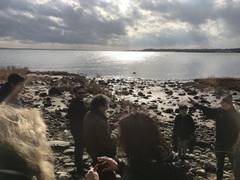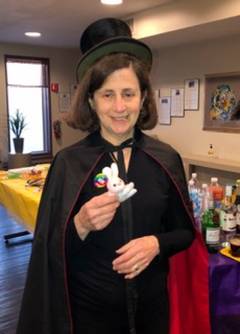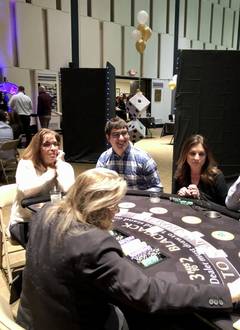Yom Kippur / Yizkor 5783: Regrets, I've Had a Few
10/06/2022 11:53:23 AM
Rabbi Ben Goldberg
| Author | |
| Date Added | |
| Automatically create summary | |
| Summary |
You can tell a lot about what people value in a life
from what they choose to highlight when it ends.
As a rabbi, I have the privilege and responsibility
to attend more funerals than the average person,
certainly of my age. And what they say
about resume virtues versus eulogy virtues
is absolutely correct.
While at times people do talk about
a person’s professional accomplishments,
there is usually much more focus on a person’s role
as a parent, spouse, friend, and neighbor.
While I’ve never seen this myself,
I read years ago that the Frank Sinatra song My Way
is among the most frequently played or quoted songs at funerals.
The song celebrates those, usually men,
who live life on their own terms
with bravado and fierce independence.
Among the song’s lyrics is a line about regret:
“Regrets, I’ve had a few, but then again, too few to mention.”
The sentiment is not unique to this song.
Indeed, our culture sometimes tells us
that regret is a, well, regrettable emotion, one to be avoided.
No regrets, sometimes people say.
Another iconic entertainer, the French chanteuse Edith Piaf
famously sang “je ne regrette rien,” I regret nothing.
The idea here, to the extent there is one,
seems to be that we should not focus on the past
and instead just plunge ahead to whatever the future will bring.
But Jewish wisdom, psychological research, and common sense
all confirm that this is bad advice.
Like the fast that many of us undertake today,
regret may be unpleasant to experience
but can nonetheless be an important tool
for personal and spiritual growth.
Regret forces us to confront the ways
in which we can be the source of our own suffering.
So, we need regret if we intend to make our futures
better than our pasts,
as wrenching as that process can be.
And so, we need Yom Kippur, our holiday of regret.
Over and over again today, we repeat our list of confessions,
which is arguably just a list of regrets.
And the weeks and days leading up to this moment
encourage us to engage in a process of teshuva,
which is about acknowledging our regrets
and then doing whatever we can to make things right.
One of our tradition’s most important stories of regret
lies just beneath the surface of Yom Kippur.
Do you remember the story of the Golden Calf?
When Moses is delayed in coming down from the mountaintop,
the anxious people prevail upon Aaron to make them a Golden Calf, which they precede to worship.
God becomes incensed at this apostasy
and plans to destroy the entire people.
But Moses intercedes,
offering reasons why that would be a bad course of action.
Hearing this, God regrets what God had planned
–v’yinachem Adonai, the Torah tells us.
While the people would be punished,
they would not be entirely destroyed.
Hearing this, the people go into mourning,
removing their fancy clothes to express regret for their actions.
And then, after 40 more days on the mountain,
Moses returns with a new set of tablets
and a renewal of the covenant that had been breached
between God and the people.
So, what we have in this story
is a broken relationship followed by mutual regret.
Both the people Israel and God look back on their past actions
–the idolatrous worship
and the plan to destroy the people, respectively–
and wish they had acted differently.
Moses then brokers a reconciliation,
enabling both sides to restore and repair their relationship.
Quite tellingly, the rabbis associate this episode with Yom Kippur. According to tradition,
Moses returned to the mountain on the first of Elul
and came down with the new tablets
40 days later on Yom Kippur.
The 13 Attributes of Mercy we recite over and over again today
also emerge from this story of breach, regret, and reconciliation.
Our Yom Kippur is likewise the culmination of a process
when we express our regrets
and then find a new way to move forward.
Yom Kippur is the day of second chances, for us,
and, it would appear, even for God.
And if God is capable of such regret,
of realizing that a course of action was unwise
and then finding a better way,
then surely we are as well.
So, what regrets does Yom Kippur invite us to experience?
For his recent book about regret,
the author Daniel Pink conducted an international study
where thousands of people submitted their regrets.
On this basis, Pink identified four basic kinds of regret
that cut across domains of life
such as romantic relationships or career.
Let’s consider each one in turn and see how these basic regrets
also show up in the Al Cheit,
the list of sins we recite again and again on Yom Kippur.
First, there are what Pink calls foundation regrets,
which are failures of foresight and conscientiousness,
where we fail to lay a foundation for future thriving.
These happen when we fail to attend
to our health or finances or education
and end up paying the price later in life.
In the mahzor, we confess sins of eating and drinking;
of disrespecting the parents and teachers
who tried to set us up for success, but whose warnings we ignored; and of confusion of the heart, where we did
what was easy and fun in the moment
instead of what would have been better in the long run.
Second, there are boldness regrets,
the mirror image of foundation regrets,
where we failed to take an opportunity or risk
that might have changed our lives for the better.
These are the choices–usually a choice not to do something–
that leave us wondering:
What If?
What if I had taken that job, asked that beautiful stranger out,
moved to a new city?
This shows up when we confess to the sin
of being stiff-necked or stubborn.
This was how our ancestors behaved
when they worshiped a calf of gold
instead of trusting in Moses and God.
And it is how we also behave
when we only see what is right in front of us,
and not the amazing possibilities waiting
just to the right or left of the path we thought we were on.
Third, there are moral regrets,
when we do something
that goes against our sense of right and wrong:
when we hurt others, flout communal norms, or act unfairly.
While this was the smallest of the four categories of regret
that emerged from Pink’s study,
moral regrets unsurprisingly make up
a good chunk of what we confess in the mahzor:
sexual immorality, wronging others, violence, fraud,
bribery, swearing falsely, breach of trust, and more.
Finally, there are connection regrets,
which result when a relationship frays or rips
and we are left holding the tattered pieces.
This too comes up in Al Cheit,
mostly in sins involving how we speak to one another:
mocking, idle gossip, talebearing, and other behaviors
that strain relationships among people.
What are we to do with this wide range of regrets,
present in both contemporary research and our ancient liturgy?
One strategy affirmed by both Pink’s research and Jewish tradition
is confession:
saying what we’ve done in speech or writing,
which concretizes our emotions into specific language
and thereby makes them feel less overwhelming.
Such confession is a major step in the process of teshuva,
as laid out by Maimonides in his Laws of Repentance,
the benefits of which have also been confirmed
by psychological research.
More broadly, we can invite our regrets to become our teacher.
Pink suggests that these four basic types of regret
(foundation, boldness, moral, and connection)
reveal through their opposites what people really value:
stability, growth, goodness, and love.
Regret enables us to learn from our mistakes and set out on a better way.
The mahzor alludes to this concept:
“Sarnu mimitzvotecha,” we say:
“We have turned away from Your mitzvot and Your goodly laws,
and it wasn’t worth it!”
With the benefit of hindsight, maturity, and experience,
we can look back and realize just where and why we went wrong,
as difficult as that can be to admit.
In that spirit, let me join Pink’s regret survey
and share one of my regrets with you.
Years ago, I had a friend with whom I was very close,
at a time in my life when I didn’t have so many such friends.
But, as circumstances enabled me
to develop more and different friendships,
I left this person behind.
We rather suddenly ended our friendship,
not because anything specific had happened,
but, frankly, because I had more and better options.
I regret this deeply:
I could have found a way to maintain what I had
even while I gained new friendships.
As I thought about this recently,
I decided to reach out to try to re-establish a relationship,
especially after a quick internet search revealed
that this person’s father recently passed away.
I haven’t heard back yet, but I hope to.
I have no idea whether this person has totally forgotten about this,
r if he wakes up every morning angry at how I abandoned him.
I hope one day to make things right.
And I’d like to think that I learned my lesson.
I now make an effort to stay in touch with certain friends
from earlier periods in my life
that it would be easy to just let slip away.
The Hebrew term for regret reveals a key aspect of this emotion.
That word for regret is related to the word for consolation.
Regret and consolation are similar emotions.
In both, we look back on the past with the benefit of time
and feel differently now than we did then.
That course of action felt right at the time,
but we now realize the error of our ways.
That loss felt devastating at the time,
but we now realize that there can be life even after loss.
When we experience both regret and consolation,
we reframe something from the past that can’t be changed
in order to feel differently about it in the present.
The regret of Yom Kippur and the consolation after grief
come together in the Yizkor service.
As we think about those we’ve lost,
perhaps regrets come to mind:
times when we were not our best selves toward those who are gone, times we were too busy with other things
we thought were more important
to spend time with the people we love,
times we got into stupid arguments that we shouldn’t have.
While the deceased may have had few regrets worthy of mention,
the finality of death might produce plenty of regrets
among those left behind.
But, perhaps with the benefit of time,
we can reach a third emotion: self-compassion.
We can temper the stringency of our desire for self-improvement
with the same compassion that we extend to others,
but too often forget to give ourselves.
And, because one of the messages of Yom Kippur
is that it’s never too late,
we can ask forgiveness even of the dead.
Our tradition teaches us that the souls of the departed
are never too far away;
they hover just beyond the confines of the world as we know it.
So, as we recite prayers of Yizkor in a moment,
let us summon up those regrets.
Let us speak them in our minds and hearts.
And then, let us turn to the spirits
of those who no longer walk this earth
and ask their forgiveness.
But most importantly,
let us turn those regrets into our teacher,
inspiring us to change our ways in this new year and beyond.
We turn to Yizkor on page 569.
Sun, November 2 2025
11 Cheshvan 5786
Photo Gallery
Photo Albums
Upcoming Events
-
Wednesday ,
NovNovember 5 , 2025Rabbi, May I? Modern Responsa
Wednesday, Nov 5th 10:00a to 11:30a
Wednesdays, 10 - 11:30 AM, KTI Library Ever since Abraham’s famous argument with God, Judaism has been full of debate. Moses and Korah, David and Nathan, Hillel and Shammai, the Vilna Gaon and the Ba’al Shem Tov, Spinoza and the Amsterdam Rabbis . . . the list goes on. No wonder that Judaism cherishes the expression machloket l’shem shamayim, “an argument for the sake of heaven.” Beyond their historical importance, what makes these disputations so compelling is that nearly all of them, regardless of their epochs, are still being argued. The parade of characters spanning three millennia of biblical, rabbinic, and modern disputation reflects the panorama of Jewish history with its monumental political, ethical, and spiritual challenges. This series will examine Jewish responses to exile from the biblical period to our modern day. Considering texts from all genres of Jewish literary creativity, we will explore how the realities and iterpretaions Join as we re-open these timeless debates that lead us to the core of 3,000 years of Jewish conversation. • Justice: Abraham vs. God (October 19) • Holiness and Authority: Moses vs. Korah (November 9) • Inclusion: The Five Daughters vs. the Twelve Tribes (November 30) • Accountability and Morality: David vs. Nathan (December 21) • Resistance: Ben Zakkai vs. the Zealots (January 18) • Law: Hillel vs. Shammai (February 15) • Spirituality: The Vilna Gaon vs. the Baal Shem Tov (March 15) • Boundaries: Spinoza vs. the Amsterdam Rabbis (April 19) • Religious Evolution: Geiger vs. Hirsch vs. Frankel (May 10) • Zionism: Herzl vs. Wise (May 31) -
Thursday ,
NovNovember 6 , 2025Coffee with the Rabbi
Thursday, Nov 6th 8:00a to 9:00a
Start your morning with some caffeine and casual or meaningful conversation! Join Rabbi Goldberg for a Coffee Chat! Stop by Rye Ridge Starbucks any of the following Thursdays, between 8-9am: June 12 and 26 July 10 and 24 August 7 and 21 September 4 and 18 October 16 and 30 November 6 and 20 December 4 and 18 -
Thursday ,
NovNovember 6 , 2025Janet Heiser Game Night 2025
Thursday, Nov 6th 7:00p to 9:00p
Bring your friends for a night of Mah Jongg, Canasta, Bridge and prizes! Thursday, November 6th at 7:00pm KTI Social Hall $30 per person ($36 per person after Nov. 3) in memory of Janet Heiser, whose tireless effort helped to strengthen Jewish connections and continuity at KTI and the greater Jewish community Co-Chairs Pam Kaplow - pdougk@aol.com Laurie Landes - lrl52@aol.com -
Friday ,
NovNovember 14 , 2025Give Thanks at Tot Shabbat 2025
Friday, Nov 14th 5:30p to 6:30p
-
Tuesday ,
NovNovember 18 , 2025Women's Rosh Chodesh Group
Tuesday, Nov 18th 12:00p to 1:30p
New Women's Rosh Chodesh Group Tuesdays, 12:00-1:30pm Gather with Cantor Sklar and KTI friends at the start of each month of the Hebrew calendar to learn about the themes and traditions of the coming month. Learn from each other, learn more about each other and better understand the women within our tradition. Enjoy music and lunch together! Please a dairy or parve lunch to enjoy at noon, followed by the discussion at 12:30pm. KTI will provide drinks and dessert. RSVP Appreciated
Privacy Settings | Privacy Policy | Member Terms
©2025 All rights reserved. Find out more about ShulCloud






